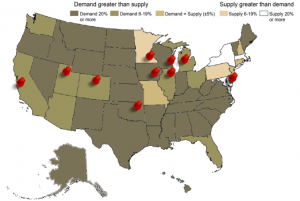What is a Movement Disorders fellowship?
A fellowship is additional training in a sub-specialized area of medicine. Trainees who have completed medical school and residency are eligible to obtain a license, board certification, and practice medicine. Some doctors opt to complete additional training at this point.
The Movement Disorders Center (MDC) trains fellows who have completed an accredited neurology residency. Each year, the program admits up to two fellows for our two-year program which means the MDC trains up to four fellows at a time.
Neurology is a large specialty. This fellowship training allows neurologists to focus on a specific area within the larger specialty. Fellows can learn more about movement disorders and their therapies, including Parkinson’s disease, Huntington’s Disease, ataxia, and essential tremor. Movement disorders fellows gain more in-depth knowledge about medications and surgical therapies for movement disorders.
Our fellows give to the Colorado Movement Disorders Community while they are training with us. The fellows are required to complete a research project during their training. Our community is at the center of this research. Fellows have access to a plethora of research specialists and gain real-world grant writing experience. Project have included:
- “Do differences risk aversion contribute to gender disparities: A survey of risk tolerance in patients with PD
- “Table Tennis as Exercise in Parkinson’s disease: assessing barriers”
- “Caregiver expectations for DBS surgery in Parkinson’s disease and its relations to caregiver burden”
- “Sleep assessed by actigraphy and direct recordings of the subthalmic nucleus in Parkinson’s disease”
- “Examining sex disparities in deep brain stimulation in patients with essential tremor”
- “Smartphone applications in deep brain stimulation evaluation and follow up for Parkinson’s disease”
- “Social cognition in Blepharospasm and Cervical Dystonia”
- “Perceived palliative care needs of Huntington’s disease patients”
- “Used of GABA Magnetic Resonance Spectroscopy to determine the role of inhibitory dysfunction in cervical dystonia”

The MDS Pilot Grant Program is one way that our fellows’ research is funded. Recipients of this funding have been able to launch larger research projects base on their data collected with the pilot grant funding.
Our fellows also provide community outreach to the region. They present to support groups or write newsletter articles for local non-profit organizations. They contribute to the education of the community so that patients and care partners can feel in control of their health.
Our program helps fellows develop an investment in their patients and matching them with therapies to improve their lives.
Our Program

Dr. Trevor Hawkins serves as the Movement Disorders Fellowship Director. He has been dedicated to medical education since his training. He is committed to ensuring our fellows get high-quality training.
The University of Colorado Anschutz Medical Campus (CU Anschutz) is the largest provider of comprehensive neurological and neurosurgical care in the Rocky Mountain Region. Our program is a major tertiary referral center for Colorado and many neighboring states. We serve over 7,000 patients through clinics at the University of Colorado Hospital, UCHealth satellite clinics, Denver Health Medical Center, and the Rocky Mountain Regional VA Medical Center.
The Movement Disorders Center has 11 faculty who work with our trainees closely throughout the year. Each of these team members has unique areas of clinical and research expertise within movement disorders.
Our center values a multi-disciplinary approach to patient care. The team works closely with a variety of subspecialists in clinic and educating trainees. Our fellows rotate through a variety of clinics to give them a robust education in movement disorders. These clinics include Huntington’s Disease Interdisciplinary Team, Advanced Therapies Clinic, Neuro-palliative Care Clinics, Neuro-ophthalmology Clinic, Neuro-behavior Clinic, and underserved populations at Denver Health Clinic.
Why is it important?
 The demand for neurologists far exceeds the supply. The demand for movement disorders neurologists is even greater. A recent Parkinson’s Foundation survey found that the number of people diagnosed with Parkinson disease annually increased from 60,000 to 90,000. This means that there will be 1,200,000 living with Parkinson disease by 2023.
The demand for neurologists far exceeds the supply. The demand for movement disorders neurologists is even greater. A recent Parkinson’s Foundation survey found that the number of people diagnosed with Parkinson disease annually increased from 60,000 to 90,000. This means that there will be 1,200,000 living with Parkinson disease by 2023.
Take the time to watch Dr. Michael Korsmo’s talk about “The Global, National, and Rural Burden of Neurodegenerative Disease.” This talk explains some of the reasons why there is a gap in neurology care.
Opportunities to Help
Need
Our funding for our fellows currently comes from solicited grant funding. These funds fluctuate from year to year. They are never guaranteed.
We accept up to two new fellows to our program each year. This means we are training up to four fellows every year.
The cost to support one fellow for one year is $90,000.
Give Now
One-Time Gifts
Use the link above to be directed to the Movement Disorders Gift Fund through a secure, online portal.
Be sure the name of the fund is Movement Disorders Center Gift Fund and the allocation code is 0222499.
Mail a check
- Make your check payable to the University of Colorado Foundation.
- In the Memo line, indicate “#0222499 Movement Disorders Gift Fund.”
- Mail your check to:
University of Colorado Anschutz Medical Campus
Attn: Office of Advancement, Marti Laule/Kendrick Lor
Mailstop A065
13001 E 17th Place, WG112
Aurora, CO 80045
Recurring Gifts
If you are interested in supporting our fellows every year, please contact our giving office representative, Marti Laule.
marti.laule@cuanschutz.edu
720-202-7845
Fundraise
If giving isn’t an option for you right now, there are other ways to help our center.
Create a social media fundraiser.
In honor of a birthday, anniversary, Colorado Gives Day, or other celebrations, consider inviting your friends and family to donate.
Be an ambassador.
Invite your friends to attend an MDC educational event with you. Invite them to learn more and understand why training more movement disorders neurologists is so important.